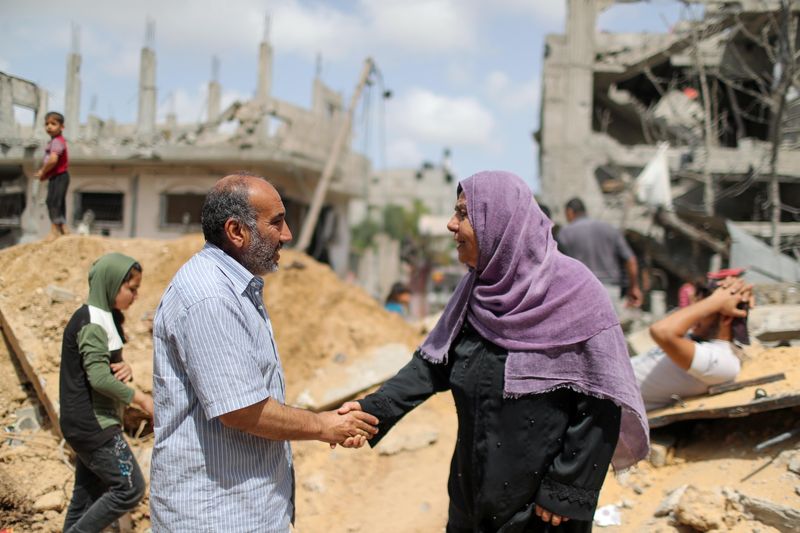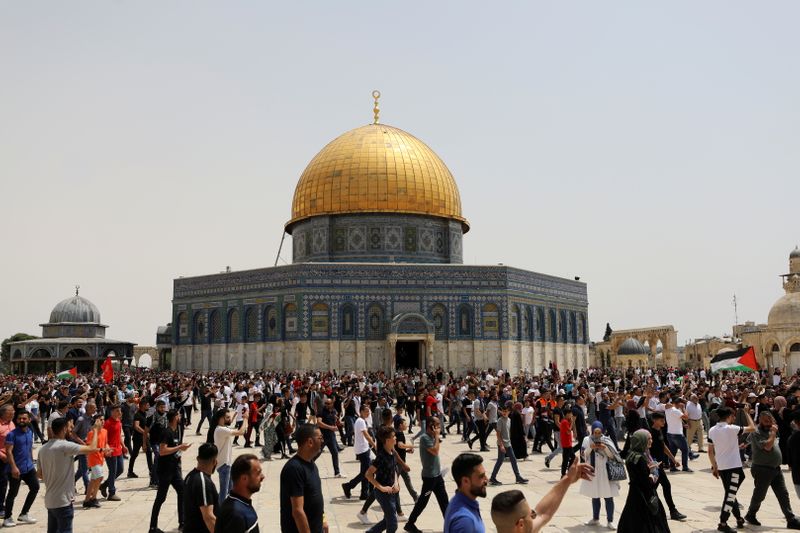By Nidal al-Mughrabi and Dan Williams (NYSE:WMB)
GAZA/JERUSALEM (Reuters) -Egyptian mediators sought to reinforce a day-old ceasefire between Israel and Palestinian militants on Saturday, and aid officials appealed for a period of calm to start tackling a humanitarian crisis in Gaza after 11 days of fighting.
The ceasefire, which began before dawn on Friday, was still holding on Saturday evening, enabling officials to start assessing the scale of the damage.
Despite confrontations between Israeli police and Palestinian protesters at a Jerusalem holy site on Friday, there were no reports of Hamas rocket launches from Gaza or Israeli air strikes on the Palestinian enclave overnight or on Saturday.
Rockets fired by Hamas and other Islamist militant groups paralysed towns in southern Israel during the hostilities, and caused widespread panic, but did much less damage than the bombardment of the Gaza Strip.
Palestinian officials put reconstruction costs at tens of millions of dollars in Gaza, where medical officials said 248 people were killed in the fighting.
A senior U.N. official who toured the densely populated coastal enclave on Saturday warned of increased health risks and widespread despair after homes, roads and other vital infrastructure including hospitals were damaged or destroyed.
"Everybody just needs to stand down and not to engage in any provocative moves," Lynn Hastings, U.N. Humanitarian Coordinator for the Palestinian territories, said in a rubble-strewn area of Gaza City where she spoke to survivors.
Economists said Israel's recovery from the COVID-19 pandemic could be curbed by the hostilities and medics said rocket attacks had killed 13 people in Israel before the ceasefire.
After mediating the ceasefire with U.S. support, Egypt sent a delegation to Israel on Friday to discuss ways of firming up the truce, including with aid for Palestinians in Gaza, Hamas officials told Reuters.
The delegates have since been shuttling between Israel and Gaza, and on Saturday met Palestinian President Mahmoud Abbas in the city of Ramallah in the occupied West Bank, an aide to the Palestinian leader said.
A source familiar with planning said U.S. Secretary of State Antony Blinken would visit Israel and the West Bank on Wednesday and Thursday, hoping to build on the ceasefire. Mahmoud, however, has little influence in Gaza, which is ruled by Hamas.
U.S. President Joe Biden said on Thursday that Washington would work with the United Nations on bringing humanitarian and reconstruction assistance to Gaza, with safeguards against funds being used to arm Hamas, which the West deems a terrorist group.
The United Nations Security Council on Saturday called for "the full adherence" to the ceasefire and stressed the immediate need for humanitarian aid for Palestinian civilians.
The 15-member council issued a statement, which had to be agreed by consensus, after being unable to speak during the 11-day conflict due to opposition by the United States.
Israel's foreign ministry said in response it was "very unfortunate" that the Security Council "ignored the launching of over 4,000 rockets at Israeli civilians from populated areas in Gaza".
Seeking to build on the truce, the EU's foreign policy chief, Josep Borrell, on Saturday urged Israel and the Palestinians to return to meaningful negotiations towards a two-state solution, which have been deadlocked for years.
"The EU cannot be expected to finance yet again the re-building of Gaza without a meaningful prospect of actually solving the underlying conflict," Borrell wrote in a blog post.
HUMANITARIAN CONCERN
After her tour in Gaza, the U.N.'s Hastings voiced confidence that existing aid mechanisms in Gaza would "make sure that assistance does not fall into the hands that is not intended to be directed towards".
Gaza has for years been subjected to an Israeli blockade that restricts the passage of people and goods, as well as restrictions by Egypt.
Both countries cite concerns about weapons reaching Hamas. Palestinians say the restrictions amount to collective punishment of Gaza's 2 million population.
Hastings said she was worried by people being crammed together into crowded accommodation more than ever following the destruction of many residential buildings.
"During COVID it was bad enough here, there was a massive spike in cases right before the escalation. Now people are sheltering together," she said.
Israel says its air strikes were a response to Hamas firing rockets at Israeli cities on May 10, following Israeli police raids on a holy compound in East Jerusalem and clashes with Palestinians during the Muslim holy month of Ramadan.
"If we come out of this operation with an extended period of peace and quiet, that's good for Israel's civilians and that's good for Palestinians in Gaza too," said Mark Regev, a senior adviser to Israel Prime Minister Benjamin Netanyahu.

Israeli Foreign Minister Gabi Ashkenazi said later on Saturday he would meet soon with his Egyptian counterpart, Sameh Shoukry, after they spoke on Friday.
"I emphasized to him that any future arrangement would have to include guarantees regarding security issues and policy principles," Ashkenazi said on his Twitter page, adding that these included "stopping Hamas' armament".
